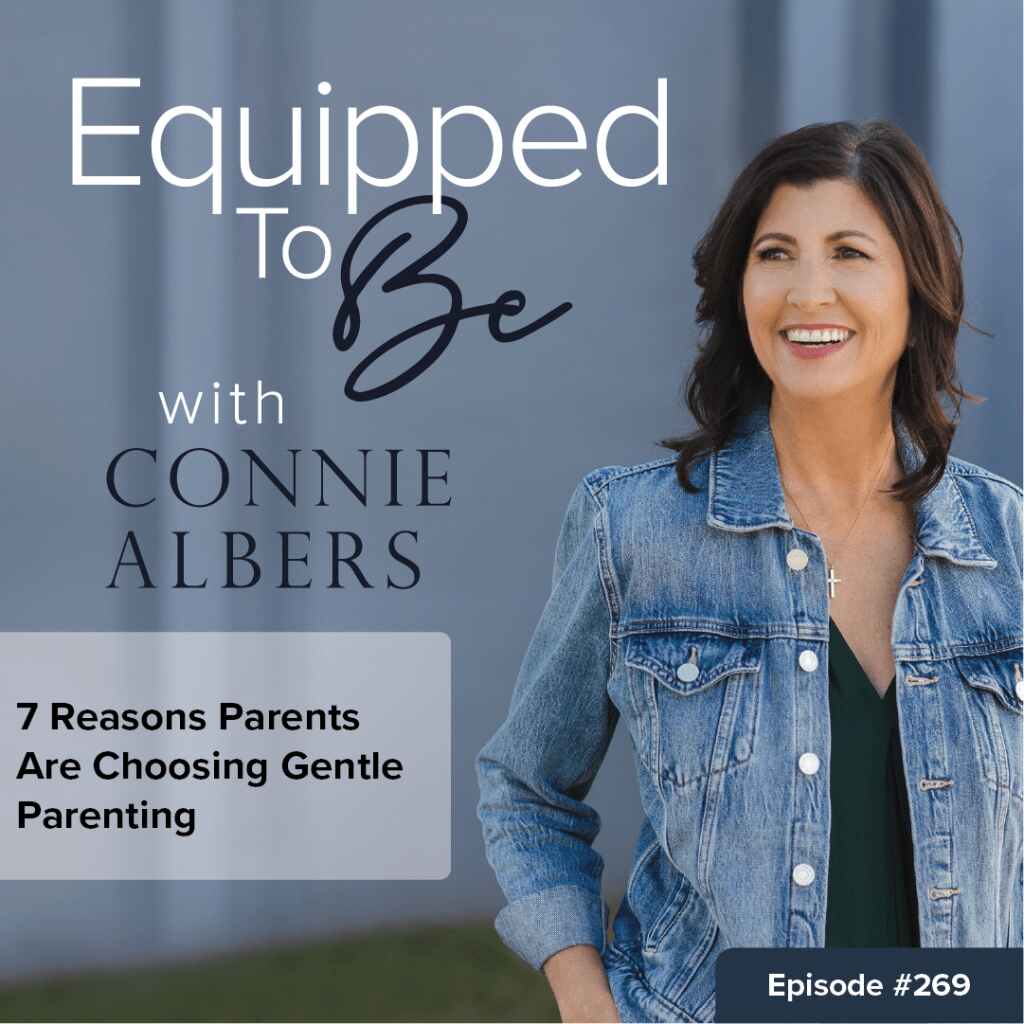7 Reasons Parents Are Choosing Gentle Parenting. Gentle parenting isn’t just another trend; it’s a reflection of what many moms and dads feel deep in their hearts. We want to raise emotionally healthy kids without repeating the patterns we grew up with.
Parents are longing for connection, not just compliance. In this episode, I’m sharing what’s behind the growing shift toward gentle parenting and why more parents, maybe even you, are rethinking the way we guide, discipline, and disciple our children.

If your heart has ever whispered, “There has to be a better way,” you’ll want to tune into this episode and read this blog.
Why Today’s Parents Are Choosing Gentle Parenting; And What That Really Means.
Gentle Parenting Definition: What Is Gentle Parenting?
Consequently, gentle parenting is a relational, empathy-driven approach that prioritizes connection, emotional regulation, and respectful guidance. Moreover, it is not permissive parenting; instead, it combines clear, consistent boundaries with compassion, patience, and mutual respect.
Consequently, gentle parenting is a relational, empathy-driven approach that prioritizes connection, emotional regulation, and respectful guidance. Moreover, it is not permissive parenting; instead, it combines clear, consistent boundaries with compassion, patience, and mutual respect.
Gentle Parenting vs. Traditional Parenting
However, while traditional authoritarian styles lean on fear, shame, or punitive measures, gentle parenting leans on curiosity and collaboration. Consequently, the child’s misbehavior is seen as a skills gap, not a moral failure, so the parent coaches, models, and problem-solves. Therefore, children learn internal motivation instead of mere compliance.
“Rules may guide behavior, but relationships forever shape hearts.”
Top Reasons Parents Choose Gentle Parenting in 2025
Here is a quick look at the top reasons parents are choosing the Gentle Parenting approach:
1. Rejecting Harsh Discipline—Gentle Parenting Benefits
Moreover, parents who experienced yelling or spanking often sense lingering wounds; thus, they vow to do better. Additionally, research on mindful parenting shows that co-regulation, rather than punishment, builds healthier stress-response systems in the brain.
2. Prioritizing Mental and Emotional Health
Furthermore, gentle parenting aligns with the rising awareness of childhood anxiety and trauma. Therefore, parents deliberately validate feelings before correcting actions, helping kids build real resilience.
3. Desiring Lifelong Connection Over Short-Term Control
Consequently, today’s parents ask, “Will this strategy draw my teen closer at 16?” rather than “Did she obey me at 6?” This shift from reactive to preventive strengthens family bonds.
4. Breaking Generational Cycles
Moreover, because millennials and Gen Z grew up hearing “children are seen, not heard,” they now strive to hear their children early and often, rewriting family scripts of silence into stories of safety.
A mom recently told me, “I remember one afternoon when my son melted down over a broken Lego set. In the past, I might’ve raised my voice. But instead, I knelt down and said, ‘I understand that you are really upset right now; that’s frustrating. That moment of connection turned frustration into calm.”
5. Trusting Neuroscience and Developmental Research
Indeed, brain-imaging studies confirm that calm, attuned caregiving wires prefrontal circuits responsible for self-control. Therefore, teaching emotional skills through gentle coaching sets up kids and parents for lifelong regulation.
6. Amplification Through Social Media Influence
Additionally, Instagram reels, TikTok clips, and YouTube shorts provide digestible demonstrations of gentle scripts. Consequently, parents replicate phrases like “You’re safe, I’m here” and celebrate incremental wins together online.
7. Faith-Forward Families See Biblical Alignment
Consequently, many Christian parents recognize that the fruit of the Spirit: love, patience, gentleness, and self-control—mirrors the principles of gentle parenting. Therefore, shepherding hearts through grace feels both practical and biblical.
Faith-Based Gentle Parenting: Aligning With Biblical Values
Because Scripture calls parents to “provoke not your children to wrath” (Ephesians 6:4), gentle parenting resonates. Moreover, Jesus models invitation over intimidation—“Come to Me,” not “Get it right or get out.” Consequently, when we discipline with empathy, we reflect Christ’s heart.
“Let your gentleness be evident to all” (Philippians 4:5).
Therefore, gentle parenting becomes a tangible outworking of faith, where boundaries flow from love rather than legalism.
How to Practice Gentle Parenting Daily: Simple Techniques That Work
- Pause Before You Pounce: First, take a deep breath. Then, ask, “What is really happening beneath this behavior?”
- Validate, Then Guide: Say, “I see you’re frustrated; meanwhile, hitting hurts.”
- Offer Choices Within Limits: Use phrases like, “You may choose to walk, or I will help you walk,” to preserve dignity.
- Model Emotional Language: Label your own feelings: “I’m disappointed, yet I’m still here.”
- Repair Quickly When You Blow It: Why? Because humility heals, apologizing models healthy accountability.
Common Misconceptions About Gentle Parenting
Myth 1: Gentle parenting means zero consequences.
However, it actually means natural or logical consequences delivered calmly.
Myth 2: Children will take advantage of gentle parents.
Nevertheless, research shows children thrive when limits are clear and empathetic.
Myth 3: It takes too much time.
Yet, investing in front-end effort often reduces meltdowns later, saving time overall.
Gentle Parenting Benefits Backed by Research
Moreover, studies across 100+ U.S. families have revealed that gentle parenting correlates with improved prosocial behavior and lower parental stress. Additionally, 44% of parents deliberately shift away from how they were raised, citing gentle parenting as their preferred alternative.
Consequently, children in attuned homes display stronger executive-function skills such as impulse control and flexible thinking, which, in turn, forecast academic success.
Conclusion: Embracing Gentle Parenting for a Connected Family
Ultimately, therefore, gentle parenting invites us to lead firmly and kindly, precisely the way our Heavenly Father leads us.
Moreover, choosing connection over control does not erase authority; instead, it redeems it with humility, empathy, and unwavering presence. Consequently, our children learn that mistakes are opportunities, families are safe harbors, and love never hinges on performance.
So, as you tuck your child in tonight, pause to reflect. Therefore, whisper truth, offer grace, set the boundary, and remember:
Gentle parenting isn’t passive; it’s intentional, anchored, and deeply engaged.
Sponsors, Related Shows, and Links
The following may contain affiliate links:
- Parenting Beyond the Rules: Raising Teens with Confidence and Joy by Connie Albers
Related Episodes
How to Connect with Connie
- Follow Connie Albers on Instagram | Facebook |X | Pinterest
- Learn more about Connie’s book, Parenting Beyond the Rules.
- Learn more about the Equipped To Be podcast
Subscribe to Equipped To Be
If you find this podcast helpful, please consider subscribing and leaving a review. It’s a great way to support the show and only takes a few seconds.


